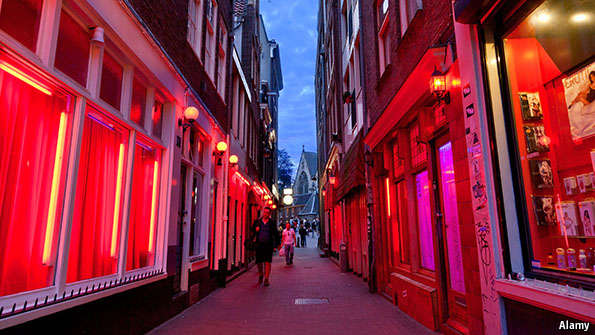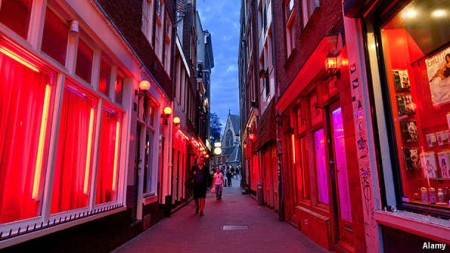THE stock market was invented in 1602 in central Amsterdam, when traders gathered on the New Bridge for the then-disreputable purpose of speculating in shares of the East India Company. Today the New Bridge marks the entrance to Amsterdam’s Red Light District, an area dominated by other trades long considered disreputable but which the city’s liberal government has tried to bring above-board. But even in Amsterdam, sex work has not shed its stigma, as a former supervisor at the Dutch Central Bank (DNB) discovered last year. The Dutch magazine Quote reported this week that the woman was fired last autumn for having secretly moonlighted for years as a self-employed sex worker, out of an address in the heart of the Red Light District.
The supervisor, referred to in the press by her dominatrix name of Conchita van der Waal, offered a wide menu of plain-vanilla and sado-masochistic services from her website, with prices ranging from €450 an hour to €4000 for a weekend. But sex work has been fully legal in the Netherlands since 2000; the problem, says DNB, was not so much the sex as the secrecy. Ms van der Waal was officially terminated for violating the bank’s code of conduct by failing to inform her superiors of her freelance employment, and by engaging in behaviour that could make her vulnerable to blackmail. “There is a misconception that we were taking a moral stance,” explains Tobias Oudejans, a DNB spokesperson. “The situation was that employees with access to confidential information should not be blackmail-able.”
This is where the issue gets more interesting. By failing to inform DNB about her side job, Ms van der Waal made things easy on the bank, giving it a clear cause for termination. (Quote later found that Ms van der Waal appeared to have broken the law by failing to register her business with the chamber of commerce or to pay taxes on the income, but DNB says these played no role in her firing.)






